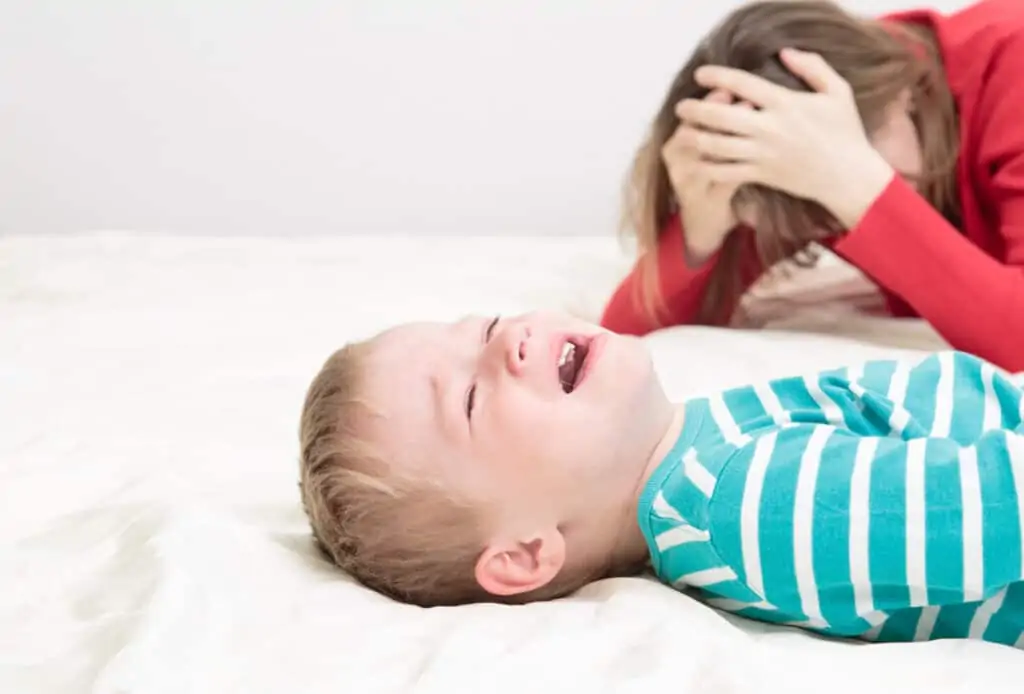Inside This Post: Positive Parenting Solutions to Be a Calm Mom & Get out of the Yelling Cycle. 9 tips to stop yourself from yelling at your kids & have a great relationship.
Ready to make BIG changes and turn down the yelling all the way? Calm Parenting: Learning to Stop Yelling as helped hundreds of parents already. See what all the fuss is about and how this ecourse retrains the brain for calm, patient responses.
Not ready for the course? The beginner’s guide to stop yelling is the perfect way to dip your toe in to making a change.
Positive Parenting Solutions to Get out of the Yelling Cycle & Back to be a Happy Mom
How are things going at your home right now?
I know, at mine, there’s way too much nagging, irritation and gritted teeth and it’s making everyone grumpy.
This cycle usually happens over Summer Break, on Winter Break and times when the kids and I are cooped up in the house when someone is sick, or we’re buried in snow.
Right now, we’re I’m in this cycle.
It feels like crud when I raise my voice and I know I’m not the only one it’s taking a toll on. The kids don’t particularly like me much when I’m like this either.
If I yell, they yell and nothing at all has changed.
Not productive, right?
The worst part…
I know better than to let things get to this boiling point!
I can usually spot my triggers before I get to the point of raising my voice, but when the cycle happens over and over, I know it’s time for a reboot.
It’s time to turn things around to get out of the yelling cycle and be a more patient, calm parent.
I know once things get moving in the right direction, everyone will settle into more cooperation and the house will fill up with laughter again.
Since I’ve been down this road before and have some easy solutions to share with you to help your mood and boost your happiness.
This list of solutions for a yell-free home are fairly simple to start as soon as you finish reading this article, but I promise, will turn things around quickly.
1. Stick to a Daily Routine for Kids to Boost Cooperation & Better Sleep!
Routines are a life preserver for parents and when your routine is a well-oiled machine, it’s going to save you from nagging, repeating yourself two bazillion times and frustrations because kids who use routine, have:
- Better behavior.
- More cooperation.
- Better nighttime sleep.
- Less power struggles, tantrums, and whining.
- Smoother transitions throughout the day.
Kids who use routines have also been shown to have better nighttime sleep, easier time falling to sleep and less wake up times at night (something we could all use a little more of.)
Really, it’s a win-win for parents and kids!
A routine tackles the necessities of your day such as naps, meals, school pick-ups, playdates, work, bedtime, etc.
Having a routine is a great way to give kids consistency, allow them a say in their day by offering choices, and set expectations for what comes next.
Try this for Easier Routines:
- We use these printable routine cards for boys and girls with all three of my kids and it’s made a complete transformation in our home and with better behavior.
- Print them out, (laminate if you have access), arrange the cards in the order of your day and let your child basically walk themselves through your daily routine without any reminders of what comes next.
The best part about using printable routine cards?
They help kids learn to follow routine all on their own, so there’s no nagging or reminding them of what comes next and in time, promotes independence and self-management.
Need help mastering your routine? Mastering Sleep & Schedules not only give you instant access to 40+ sample daily routines, but covers everything from where to start, adjustments to make, number of hours of sleep kids need and naps!
2. Find Your Hot Spots in the Day & Build in Breaks
There are points in the day when you are more susceptible to getting angry and losing your temper.
These are what I call “hot spots.”
Hot spots trigger you just like misbehavior and environment can.
Here are the most common hot spots I see among parents:
- The morning rush to get out the door on time
- When family members are tired or hungry and falling apart
- When you’re most drained of your energy
- Family visiting or stay at your house
- The stress points of the day such as making dinner and juggling homework
- Bedtime routine
- Leaving playdates or an activity
- Right before naptime
- Grocery shopping
- Running late
- When you’re on the phone and keep getting interrupted
These situations are when you’re the most vulnerable to triggers, and likely when misbehavior increases.
Sometimes the answer is related to our parenting: needing to create a daily routine, enforce rules before things are out of control, or following through on what we say.
Sometimes the answer is how we take care of ourselves. What self-care practices do you have in place which can help you manage your time, feelings and energy better?
Once you find the parts of your day when you’re more susceptible to anger, you can build in ways to help you.
For example, if running late is a trigger for you to get angry, add in 10 extra minutes to help you get the kids out the door on time.
3. Take Care of Yourself
This isn’t anything new, and you’ve heard this all before right?
You can’t give to your family and children is your well is dry and you have nothing to give.
In other words, if you want to be a positive influence on your family, you need to take care of yourself first. This means you need to not only make sure you’re getting enough sleep and eating food that nourishes your body, but putting yourself on the calendar too.
You need to schedule activities for yourself that make you happy, feed your mind and heart and also make you feel a sense of accomplishment, so you can go back to your kids and family feeling fulfilled enough to give part of yourself to them.
4. Change Your Voice
One of the easiest and simplest tricks to change your environment and get your kid’s attention without yelling, is to whisper.
Yelling can be heard above all the noise, but when you whisper, everyone needs to stop what you’re doing and give you full attention to hear you.
I know this sounds crazy, but you’ll be surprised how quickly everything will go quiet in the room so your kids can listen to what you are saying.
5. Get Some Fresh Air
Fresh air and being in nature has so many benefits and when you’re in a funk, can do wonders to your emotional state and even your blood pressure.
According to the American Heart Association, spending time in nature can help relieve stress and anxiety, improve your mood, and boost feelings of happiness and wellbeing.
A recent Dutch study found that spending time in nature and performing repetitive tasks such as garden, can fight stress and put you in a better mood more than other leisure activities. It was shown that those who performed repetitive tasks had lower levels of the stress hormone, cortisol.
Also when you’re inside, the air becomes polluted which means your body has to work harder to get the oxygen it needs to function. All this extra hard work can raise your heart rate and blood pressure.
However, when your brain has access to fresh air, it doesn’t have to work as hard (lower heart rate and blood pressure), and breathing fresh air can also help regulate your levels of serotonin.
With too much serotonin, you can become irritable and tense, or too little can make you depressed.
Balanced levels of serotonin help to promote happiness and well-being.
So, open your windows and doors to circulate fresh air in your house, but also, step outside for 15 minutes when you feel your blood pressure begin to rise, for an instant boost of happiness and dose of calm.
6. Get Down on Their Level
This is one of my favorite tools in my parenting bucket, because it’s so simple, yet also because it forces me to connect with my child and my child to connect with me.
Squat down at the level of your child so you’re eye to eye. Now that you’re a foot away and looking at your child, do you really think yelling at them will come easy?
The short answer? NO.
When you’re face to face, it immediately calms you down, but also, your child can hear you and look you straight in the eye. This opens the communicate on a gentle level and brings your connection back to love.
7. Tag Out with Your Partner or Call a Friend or Family Member
When things feel intense, before you can react instead of respond to your kid’s needs or misbehavior, ask your partner, neighbor, Mom or friend to take over for 20 minutes while you take a break.
20 minutes can help you step outside for fresh air, gain a new perspective on the situation and calm down.
If you’re solo, set your kids up to play independently for this time and step out of the room, but not out of earshot just in case, to take a mini moment for yourself. Here are my favorite 20-minute activities for the kids to play solo while I’m decompressing or cooking dinner.
8. Ask for a Hug
Sometimes, all it takes is to wrap your arms around your little love to remember how much you love them and don’t want to yell at them.
When you’re looking in their eyes and feel their body sag into yours, all you want to do is hold them for moments longer, not raise your voice or say something you don’t mean.
Hold your hug for 20 seconds, the length of time Harvard Medical found to increase your levels of oxytocin (the love hormone), reduce blood pressure and cortisol (the stress hormone) and skyrocket your levels of happiness, and connection.
9. Reach for the Experts to Find New Solutions
When in doubt, pop over to your stack of professionals for a refresher of how to respond to stressful parenting situations and focus on better ways to communicate, other than yelling. Here is my 20 go-to positive parenting books if I need to do just that.
This Might Also Help…
- 10 Tips to Help You Become a More Patient Parent
- How to Stay Calm When Your Child Misbehaves
- The Real Reasons Parents Yell: How to Stop Yelling At Your Kids
- How to Get Kids to Listen Without Yelling
Want even more?
Shop All Parenting Resources
Shop all of our parenting resources from self-regulation tools and managing big emotions to building self esteem and confidence. There are resources for all seasons of life!









